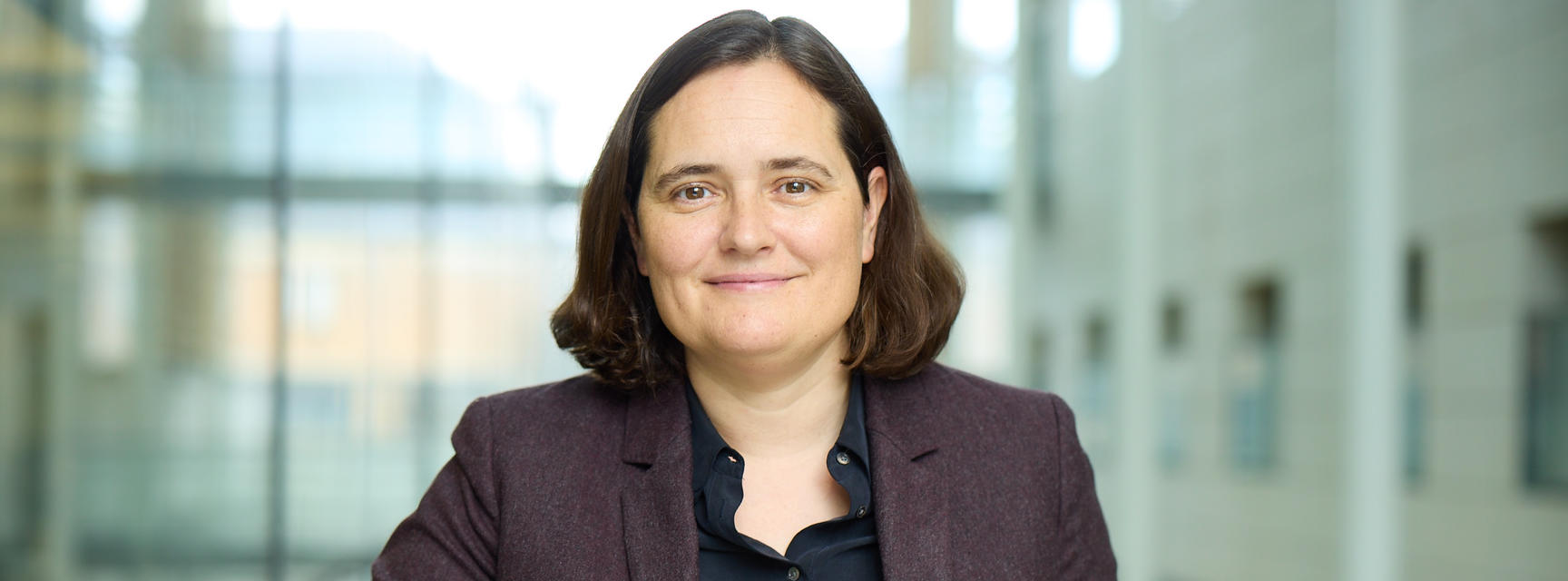Charlotte Williams appointed to the Professorship of Inorganic Chemistry
Professor Charlotte Williams OBE FRS has been appointed to the Professorship of Inorganic Chemistry, one of Oxford’s five statutory chairs in Chemistry.
Prof Williams’ research is focused on catalysis and polymer chemistry. She develops new sustainable technologies, including methods to activate and use carbon dioxide and ways to produce sustainable polymers. The polymers she works on include plastics, elastics, adhesives, surfactants and electrolytes used in consumer products, batteries, electronics and transportation.
During her career, Prof Williams has received commendations including the RSC Tilden Prize, the Royal Society Leverhulme Medal, and an OBE in 2020 for Services to Chemistry. She is currently Associate Head of Department (Research) in the Department of Chemistry. Prior to her time in Oxford, she was a professor, and head of materials chemistry, at Imperial College London. Earlier in her career, she was a postdoctoral researcher investigating organometallic polymers for electronics at the University of Cambridge, and zinc catalysts to make bio-based plastics at the University of Minnesota. Her degree and PhD are from Imperial College London where she studied organometallic catalysts for ethene polymerization.
Prior to Prof Williams, the previous Professors of Inorganic Chemistry at Oxford were Peter Edwards, Malcolm Green, John Goodenough (also Nobel Laureate in 2019), and the first holder of the chair, John Stuart Anderson.
Prof Williams is an expert in catalysis, sustainable chemistry and polymer materials. All of the polymers her team develops are designed to be renewably sourced, with structures managed from the atomic to the macroscopic length-scale for their target applications. The team also considers the end-life management of the polymers, to allow for recycling or degradation depending on their application.
A major area of interest for Prof Williams is carbon dioxide chemistry. Her team have discovered high performance catalysts that allow CO2 to be transformed into oxygenated polymers. Williams’ catalysts feature two metal centres, often acting better together to maximise carbon dioxide uptake at low pressures and produce useful polymers and materials. She specialises in understanding how carbon dioxide is incorporated into the polymer, applying spectroscopy, kinetics and computational methods to provide theories that explain catalytic synergy and carbon dioxide chemistry. The CO2-derived polymers show significantly reduced greenhouse gas emissions, and are useful for applications including home insulation and other long-lasting consumer products.
She has also researched a new type of self-switchable catalysis, whereby a single catalyst selectively enchains mixtures of monomers and is switched between different catalytic cycles on demand. The switches are triggered by the presence or absence of key monomers, like carbon dioxide or cyclic anhydrides. Highly sequence-selective copolymers can be formed using this method. She remains especially interested in developing other forms of switchable and selective catalysts that work using raw material or impure mixtures, since these are often found in both natural and industrial systems.
Making polymers is only part of the picture. Prof Williams’ team are just as interested in the process of unravelling polymers back to useable monomers. Her team have been developing low-temperature recycling catalysts that reverse the polymerisation process, often starting from a polymer chain end, so as to selectively produce pure monomers. The team have so far discovered low temperature recycling routes that work for different types of polyesters and polycarbonates, including recovery of the monomers from waste plastic packaging being used in Oxford’s Chemistry Research Laboratory cafeteria.
Much of Prof Williams’ work is driven by catalysis using earth-abundant metals, such as sodium, potassium, magnesium and iron. These highly abundant elements also come at a lower cost than other metals.
Fundamental inorganic and materials chemistry is at the heart of Prof Williams research. She says:
"Our approach to catalyst discovery is underpinned by investigating the reaction thermodynamic and kinetic parameters and trying to unravel the catalytic structure–performance relationships. We apply this same thinking when correlating molecular scale understanding of polymer structure with the polymer’s bulk properties and recycling chemistry.
Ultimately, we would like to develop the understanding and theories that will allow chemists to select the right catalyst and process to make – or recycle – the best materials.
Prof Williams pays particular credit to the research teams she has worked with over her career, including her past advisors, mentors, academic collaborators, industry partners, and, most of all, to her current and past research team.
Teaching and mentoring are high priorities for her:
The reason I come into the lab every day is to work with such a talented and committed research team who have the energy and enthusiasm to try to solve complex scientific questions. Not only is it great fun, but seeing them develop their independence, scientific confidence and careers is one of the most rewarding parts of the job.
Throughout her career Prof Williams has worked closely with industrial partners. She founded, and still serves as Chief Scientific Officer, at Econic Technologies, a UK company that sells catalysts and processes globally, enabling carbon dioxide utilization. She will head up the recently announced SCHEMA sustainable chemicals and materials manufacturing hub, which is focused on transforming the way chemicals and polymers are designed, made and recycled.
In her view, we need even more scientists and engineers to propose creative and distinctive approaches to chemical production, polymerisation and recycling. She says:
Only with enough focus on transformative discovery science can we hope to answer the environmental and societal questions surrounding the most sustainable ways to make and use our future materials.
Prof Williams has also worked with national and international expert teams advising on how to improve sustainability in the chemical industry, including the UN Global Plastic Pollution Treaty that is currently being negotiated, and a recent Royal Society briefing on defossilising the chemical industry.
Prof Charlotte Williams OBE FRS is appointed to the Professorship of Inorganic Chemistry and will become a Fellow of St Catherine’s College. You can read the official announcement in the Oxford Gazette (5424, vol 154, p 515).
Photo: Ian Wallman (2022).





